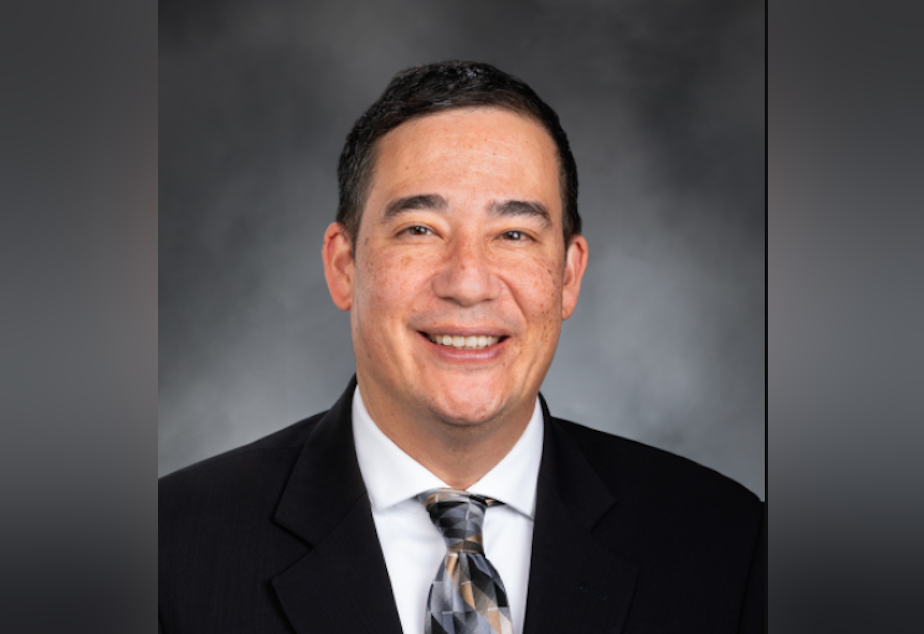Hobbs, Anderson lead in WA Secretary of State’s race

Democratic incumbent Steve Hobbs and independent challenger Julie Anderson were leading Washington’s top two primary for Secretary of State after the initial ballot count Tuesday night. Republican Bob Hagglund, who has never held public office, was in a close third place.
With more than a million ballots counted, Hobbs had 41 percent of the vote, while Anderson had nearly 13 percent. But Hagglund trailed Anderson by fewer than 5,000 votes and Republican state Sen. Keith Wagoner, the fourth-place candidate, was just 2,000 votes behind Hagglund. The results could change as later-arriving ballots are counted in the days ahead.
In an interview, Hobbs, a former state Senator who was appointed to the position last fall, said he was pleased to be in the lead.
“I’ve only been in office for eight months and we’ve made great strides... going across the state to let people know who I am and what I stand for, and I think this is kind of testament to all that hard work,” Hobbs said.
Anderson, who currently serves as Pierce County auditor, said in an interview that she is hopeful she can hold onto her current second-place finish.
Sponsored
“It was a crowded field, but I’m optimistic,” Anderson said. “My prediction is the trend will hold, but we’ve got hundreds of thousands of votes left to count.”
If Anderson hangs onto her whisper of a lead through the final vote count, she will be the rare independent candidate to advance to a general election. Generally, Washington’s top-two primary favors Republican and Democratic candidates.
Hagglund did not immediately respond to a request for comment. Wagoner, in a text message, said he wasn’t ready to issue a statement yet, adding: “Everything is too tentative.”
Washington’s Secretary of State oversees elections, registers corporations and nonprofits and operates the state archives, among other responsibilities.
Normally, the position wouldn’t be on the ballot in a midterm election. But last November, incumbent Republican Kim Wyman resigned to take an election security post with the Biden administration.
Sponsored
Democratic Gov. Jay Inslee appointed Hobbs, who at the time was a state Senator, to fill the role until the next election. Whoever wins in November will serve the remaining two years of Wyman’s term, which runs through 2024.
By appointing Hobbs to the position, Inslee effectively ended the Republican Party’s nearly 60-year lock on the Secretary of State’s office.
Hobbs, who is Asian American, is also the first person of color to hold the office.
In his campaign materials, Hobbs, a lieutenant colonel in the Washington National Guard, says his priorities include increasing cybersecurity, combating misinformation, and improving outreach to underserved voters, including those who have disabilities or who don’t speak English.
Anderson, a three-term county auditor, emphasizes her experience as a certified elections administrator and has campaigned on a platform of making the Secretary of State’s office nonpartisan. She says if elected, she would work to create a nonpartisan election observer corps and standardize “air gap” testing to verify that election tabulating equipment can’t be connected to the internet.
Sponsored
A total of eight candidates filed to run for Secretary of State in the primary, including four Republicans and two Democrats. The crowded field included America First (R) candidate Tamborine Borrelli, who leads a group that filed lawsuits challenging the 2020 election in Washington. Borrelli campaigned on a platform of ending vote-by-mail and requiring that ballot be counted by hand. She was getting less than four percent of the vote on Tuesday night.
Hobbs dominated the fundraising race with a reported $430,502 raised as of primary day. His contributors included a blend of businesses such as Amazon and Microsoft, and unions such as the Washington State Building and Construction Trades Council and Laborers Local 242.
Anderson raised the second most with a reported $195,682 in contributions mostly from individuals.
More than 4.8 million ballots were sent to voters for the August primary. As of Monday, nearly 1.1 million had been returned, representing about 22 percent of the ballots. In 2020, a presidential election year, the primary election turnout in Washington topped 54 percent. In 2018, the last midterm election, turnout was much smaller at just shy of 41 percent.
The top two finishers in each race will advance to the November election, regardless of party affiliation. [Copyright 2022 Northwest News Network]

